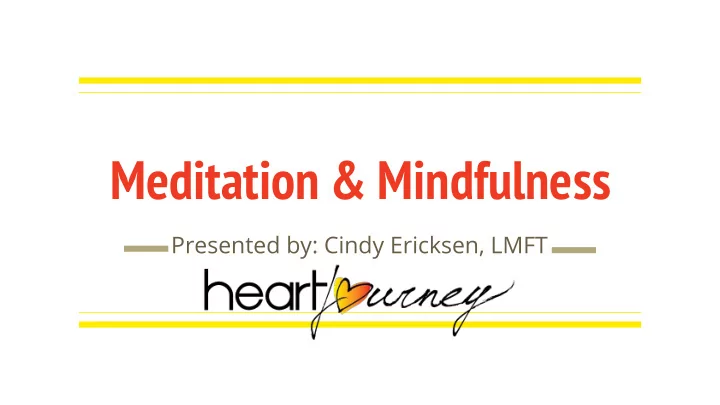

Meditation & Mindfulness Presented by: Cindy Ericksen, LMFT
Mindfulness helps us be more in charge of our own mind.
Some Definitions MINDFULNESS means maintaining a moment-by-moment awareness of our thoughts, feelings, bodily sensations, and surrounding environment, through a gentle, nurturing lens. It is a way of being in the world. MINDFULNESS MEDITATION is a mental training practice in which you focus your mind on your experiences (like your thoughts, your breath or the sounds you hear) in the present moment.
Is Mindfulness a Religious Practice? Though it has its roots in Buddhism, a secular practice of mindfulness and mindfulness meditation has entered the American mainstream in recent years.
Daily Mindfulness Practices…. If mindfulness is moment by moment awareness, then mindfulness practices are about how we spend those moments. How we spend those moments is a choice. Do you sit steaming mad at a red light because you’re late… or see it as an opportunity to breathe deeply and practice patience? Do you take 3 - 4 seconds to appreciate the lovely flowers in the planter… or walk by while worrying about your next meeting? Do you show empathy when your spouse has a bad day… or look annoyed and walk away?
Meditation By The Numbers...
General wellness (76.2%) Why people start Improving energy (60%) meditating Aiding memory or concentration (50%) Reducing anxiety (29.2%) 60% reported meditation Reducing stress (21.6%) helped them significantly. Decreasing depression (17.8%)
10 million American adults now say they practice some form of meditation regularly.
Over 14% Of US adults have tried meditation at least once.
3x Since 2012 the number of people practicing mediation in the US has tripled.
Over 12% Meditation has been shown to decrease depression relapses by 12%.
10% Happier
Dr. Richard J. Davidson Dr. Richard Davidson of the Center for Healthy Minds at the University of Wisconsin-Madison has been a pioneer in the study of the effect of meditation on the brain. In 2006 Time Magazine named Dr. Davidson one of the most influential people in the world.
Science Shows Meditation Can Help... Increase Focus and Concentration Control Your Temper Be a Better Listener Fend Off Depression Lower Blood Pressure Reduce Worry and Anxiety Be More Assertive Set Boundaries and Say No Deepen Your Spiritual Life Lose Weight Stick with Your Goals Lower Daily Stress Be a Better Leader Fall Asleep Faster
Achieving Transformative Change Changing Your Brain & Using “The Pause”
Change Your Brain, Change Your Life Mindfulness meditation increases neuroplasticity -- ● the ability to modify the structure of the brain. It also increases the density of grey matter in ● regions of the brain linked to learning, memory, emotional regulation, and empathy. Traits we think are fixed like a quick temper, ● moodiness or compassion are learned skills, not fixed characteristics -- and can be changed through meditation.
Meditation Creates an Alternative to Living Reactively Using “The Pause” When we meditate regularly we find “The Pause”. This is the moment between when we have a thought or experience, and when we react to it. During “the pause” we can choose how we respond, rather than being reactive. This allows us to change old patterns and respond in new more helpful ways.
Slow Down Your Monkey Mind … for a Moment Constant chattering of the mind. ● Self-sabotaging thoughts that ● undermine confidence. Unhelpful worrying that leads to ● anxiety. Emotional triggers that lead to ● reactive behaviors.
Meditation Apps
Recommend
More recommend